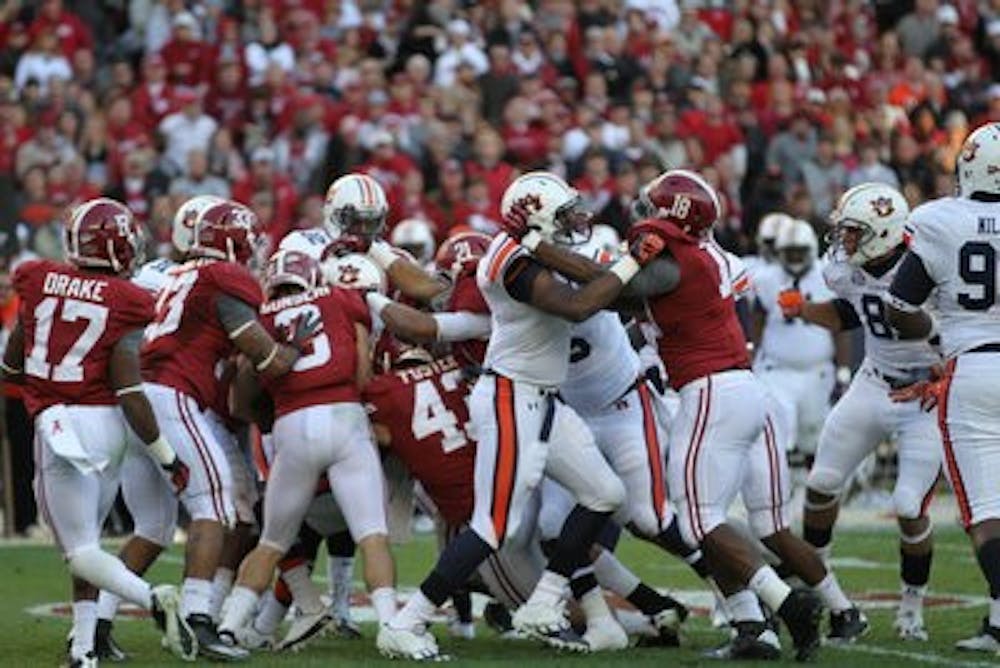Nine years is a long drought, no matter what’s at stake.
But for a winless streak in the Iron Bowl, chances are good that nine years may seem even longer.
“It’s hard to imagine in this day and time, but Auburn was under Alabama oppression in those days,” said David Housel, Auburn University’s sports information director at the time.
“We hadn’t won in nine years, couldn’t recruit; I mean, it was just awful.” The University of Alabama, under legendary head coach Paul William “Bear” Bryant, had beaten Auburn University from 1973-81, and if you asked fans of the Crimson Tide, there was no end to the streak in sight. Despite what the Tide thought, the momentum was about to change when a freshman running back by the name of Vincent Edward “Bo” Jackson came to The Plains in 1982.
“He’s a once in a lifetime player,” said Pat Dye, who was in his second year of head coaching at Auburn at the time. “People who were around him, both in college and the pros, they knew because they saw what he could do everyday in practice.” However, ask Housel and he’ll tell you the attitude surrounding the Auburn football program began to change the year prior, in Dye’s first season as head coach.
Housel recalled the meeting between Bryant and Dye, who had been an assistant to “The Bear” at the University of Alabama from 1965-73, at midfield prior to the 1981 Iron Bowl in Birmingham.
“Coach Dye walked up to Coach Bryant and said, ‘Coach, I just want you to know, we’re coming after your ass,’” Housel said.
The aura, the confidence around the Auburn football program was beginning to grow. Nonetheless, the play still implanted in the minds of Auburn fans of old didn’t occur until a year later – it will forever be known as “Bo over the top.” It was fourth-and-goal from the one yard-line with just over two minutes to play and Auburn trailing Alabama, 22-17. Jackson was lined up in the backfield behind quarterback Randy Campbell. Campbell took the snap, pivoted and handed the ball to Jackson.
Next thing you know, Jackson’s leaping over the line of scrimmage. He’s hit at the apex, but his power carries him into the end zone. Auburn scores and takes the lead, 23-22. It turned out to be the game’s final decision.
“It meant Auburn was back,” Dye said. At that moment, the sense of confidence Dye brought to the program a year before was not only instilled in his players, but also in the Auburn community.
“Bo said no to all of that influence, that power, that affluence, and he chose to come to Auburn,” Housel said. “At that time, it was a little bit like David had slain Goliath. It was what defined Bo and what gave Auburn people hope that things were about to change.”
Dye attributed his success to a familiarity with the territory. He had been on both sides of the rivalry, as well as played his college ball not far away at the University of Georgia, and was aware of what would be demanded of him.
“I knew when I came to Auburn that to survive being the head football coach, you’ve got to beat Georgia and Alabama,” he said. “You don’t have to beat them every year, but you’ve got to be competitive with them.”
And competitive he was.
Dye won as many games as he lost against Alabama in his 12-year career as head coach at Auburn and one-upped the University of Georgia, winning seven of the 12 matchups in what is known as the Deep South’s Oldest Rivalry.
However, his two head-to-head bouts with one of the greatest, if not the greatest, of all time in Bryant were what set his foundation as an Auburn legend.
As it turned out, Auburn’s victory in the 1982 Iron Bowl over Alabama may have done more to Bryant than anyone ever imagined. He went on to announce his retirement prior to coaching his last game in the 1982 Liberty Bowl against Illinois.
It was less than a month later, on Jan. 26, 1983, Bryant passed away, leaving behind a legacy matched only by few, if any, to this point.
“I think Coach Bryant’s heart for football, it was what he loved doing. It was his life – his players were also a very big part of that – and he did it to a degree of excellence,” said Jeremiah Castille, a former defensive back for Bryant from 1979-82.
“He put everything he had into it. That’s why I think, once he announced his retirement, what God had put him on the Earth to do, he was through doing it, and the Lord just called him on home.”
The 1982 Iron Bowl happens to be one of the more influential and memorable games in the series’ history because it served to put Auburn back on the map and make the series competitive, but there are bound to be many more to come.
And if not, the fans will do their best to make it seem that way, nonetheless.
Football is a way of life in the South, and the Iron Bowl exemplifies that to the greatest extent.
“Alabama’s a different state,” Dye said. “They talk about the Iron Bowl 365 days a year. Down here, it’s just part of the culture – you’re either an Auburn fan or you’re an Alabama fan. That’s just the way it is.”
Do you like this story? The Plainsman doesn't accept money from tuition or student fees, and we don't charge a subscription fee. But you can donate to support The Plainsman.





